






From left, Nimble Needle employees Courtney Kuriger, Marci Slotin, Eloise Boylan, Carolyn Stovall, Aleena Ke, Mindi Sard, owner Jan Rogers and social media manager Emmie Rogers stand behind a wall of thread at the shop’s expanded location. The COVID-19 pandemic saw an explosion in people interested in needlepoint. See story and more photos, page 6.


SANDY SPRINGS, Ga. — Sandy Springs is forging ahead on the creation of three ordinances that would change the way residents and visitors interact with one another inside city limits.
The regulations would restrict how people can canvas, protest and distribute materials, including newspapers, in Sandy Springs.
Some elected officials pushed back during a second discussion of the proposed ordinances at the Sandy Springs City Council’s March 18 work session.
The Sandy Springs Police and Legal departments recommended adoption of the three laws, which the Anti-Defamation League (ADL) researched and prepared for the city.
To open the discussion, Ryan Pelfrey, senior associate director of the ADL’s Southeast region, explained the background of the ordinance language.
“In recent years, ADL has witnessed an alarming surge in incidents of antisemitism and hate,” Pelfrey said.
See ORDINANCE, Page 4
NEWS TIPS
770-442-3278
AppenMedia.com
319 N. Main Street Alpharetta, GA 30009
HANS APPEN Publisher CONTACT
Contact reporters directly or send story ideas to newsroom@appenmedia.com.
LETTERS, EVENTS AND ANNOUNCEMENTS
Send your letters, events and community news to newsroom@appenmedia.com. See appenmedia.com/submit for more guidance.
ADVERTISING
For information about advertising in the Sandy Springs Crier or other Appen Media properties, email advertising@appenmedia.com or call 770-442-3278.
CIRCULATION
To start, pause or stop delivery of this newspaper, email circulation@appenmedia.com or call 770-442-3278.



By CARL APPEN, PAT FOX and HAYDEN SUMLIN carl@appenmedia.com, pat@appenmedia.com
hayden@appenmedia.com
ATLANTA — The Georgia Court of Appeals ruled March 13 that a lower-court decision favoring the City of Sandy Springs in an Open Records lawsuit was premature.
The ruling is a setback for Sandy Springs and its practice of tailoring police reports released to the public to include nothing but the barest of data.
Responding to the ruling, Sandy Springs Mayor Rusty Paul said the appellate court’s procedural determination does not affect the substantive part of the trial court decision.
“Council will discuss this matter and proceed in a manner that ensures public access to vital information while protecting the integrity of the investigative process,” Paul said.
Appen Media brought suit against the city May 2024, claiming it is violating the Open Records Act by denying the newspaper access to initial police officer narratives that are routinely filed during early stages of investigations.
After a Fulton County judge ruled in favor of the city last December, Appen appealed the decision to the higher state court. In its ruling, the Court of Appeals determined, “the trial court’s grant of summary judgment was premature. Genuine issues of material fact remain based on this record and thus the trial court erred by granting summary judgment to the City.”
The Georgia Open Records Act maintains that all public records are open for public inspection, but it does allow exceptions. The law provides some latitude for withholding materials surrounding ongoing police investigations. However, initial police crime and incident reports are required to be made available to the public.
For over a year, the paper has pushed Sandy Springs for more details about calls its police officers have been dispatched to investigate.
In most cases, the agency has returned the requests with one-sentence narratives stating when and where police were dispatched to and, usually, for what reason. Unlike incident reports provided by police agencies in surrounding jurisdictions, the Sandy Springs reports lack details on the nature of the crime, an accounting of property damage, injuries associated with a crime, whether any arrests were made, and whether any suspects have been identified.
Sandy Springs admits that officers responding to incidents generally write more detailed reports in a second docu-
ment, often written the same day. The city claims in its legal defense that this second report is not part of the initial incident report, and therefore doesn’t have to be disclosed.
In its complaint, Appen cited examples of Sandy Springs reports where both documents were created at the same time on the same day. When the newspaper filed open records requests for the reports associated with these incidents, the city only provided the first, one-sentence page.
Appen noted in its complaint guidance from the Attorney General’s Office that, “A common-sense interpretation of ‘initial incident report’ is that anything written at the same time as the first part of the report is part of the initial incident report.”
In December, Fulton County Superior Court Judge Kimberly Adams ruled in favor of the city, saying Appen Media failed to prove it is unlawful for the department to withhold the additional information.
Adams said Appen’s use of the Attorney General’s assessment is not the law, “although [Appen] may be correct in its assertion that [the Sandy Springs Police Department’s] practice violates the spirit of the Open Records Act.”
Appen appealed the decision to the state Court of Appeals. On March 13, the higher court rejected the lower court action.
The ruling says the city did not prove that the records should have been withheld in the first place.
“Here, it was the City’s burden to show why the requested records should not be disclosed as a matter of law,” the judgement states. “The City fails to meet its burden.”
The court also focused on the Georgia laws underpinning the case.
State open records laws read that “initial police arrest reports and initial incident reports,” are always subject to release, even if they are part of an ongoing investigation.
The appellate court’s decision points out that while, “the Act requires disclosure of ‘initial incident reports,’ it does not define that term.”
Even so, it argues that whether or not a document is an initial incident report must be weighed on a case-by-case basis, instead of the report’s title or when it was produced.
The Court of Appeals rejected the city’s blanket defense that only the first, brief report is always considered the initial document.
“Whether a narrative report prepared at the same time as an incident report actually constitutes part of that initial incident report is a fact specific inquiry,” the court wrote. “In some cases it may, and in some cases it may not.”
The appellate court’s ruling says it did not, nor did the lower trial court, have enough information to determine whether the documents in question should have been released.
During the lower court’s discovery process, Appen Media asked the city to submit the complete reports – both the brief account and the second account with more details – for the incidents.
Sandy Springs did not provide all of the materials.
Without these materials and the ability to compare the two, the appeals court says “the trial court’s grant of summary judgement was premature. Genuine issues of material fact remain based on this record and thus the trial court erred by granting summary judgment to the City.”
As a result of this decision, the case will go back to the lower court for reconsideration. Both parties also have the option to appeal to the state Supreme Court or reach a settlement.
Court of Appeals Presiding Judge Christopher McFadden filed a concurrent opinion in the decision, saying that the ruling should have gone a step further.
Citing the city’s actions for filing separate reports, McFadden wrote: “I would hold that this practice is an improper circumvention of the [Open Records] Act and that the responding officer’s full narrative about his or her initial response to the incident also constitutes an ‘initial incident report’ subject to disclosure under the Act.”
McFadden also addressed the lack of materials the city provided in the discovery process.
“The possibility that the more detailed narratives associated with Appen Media’s requests might also contain information that is exempt from disclosure merely highlights the existence of questions of fact as to whether the City disclosed what it was required to in response to Appen Media’s requests,” he wrote.
“The evidence, viewed most favorably to Appen Media, shows that Appen Media requested incident reports but received only the short reports and not any more detailed narratives. And there is evidence, by way of examples from closed cases, of instances when responding officers included one- or two-sentence narratives about an incident in a short report and the rest of that narrative in a more detailed narrative report.”
After describing an example in the court record, McFadden went on: “A factfinder could infer from the closed-case examples that similar, more detailed narratives exist for the incidents that are the subjects of Appen Media’s open records requests, but the City did not disclose them.”
By HAYDEN SUMLIN hayden@appenmedia.com
ATLANTA — Fulton County Commissioner Dana Barrett asked her colleagues March 18 to back her resolution opposing state Senate Bill 244, which would allow defendants to recoup fees if a prosecutor is disqualified for misconduct.
State Sen. Brandon Beach, a Republican representing parts of North Fulton and Cherokee counties, sponsored SB 244.
Beach, a prominent ally of President Donald Trump, told reporters that he had in mind the actions of Fulton County District Attorney Fani Willis in the state’s racketeering case against Trump, according to Barrett.
“Whether you like the language or don’t … the fact of the matter is this is a state officer, we should not pay the bill,” Barrett said. “For that reason and that reason alone, we should be opposing this bill. We can put [aside] the whole rest [of the] conversation, the intent, the language … it does not matter.”
While Willis and her office cannot continue prosecuting the Georgia election interference case against Trump and his allies, she is appealing that restriction.
Also, the case has not been dismissed.
Barrett said without the Commission’s opposition, the bill is likely to pass. She said she thinks the county needs to protect its taxpayers and coffers.
Commissioners Bob Ellis and Mo Ivory voiced opposition to Barrett’s resolution, which they said should have been a part of the External Affairs Department’s regularly scheduled legislative update.
Ellis cited a recent example of the Board coming together to take a position against a bill creating a development authority during a legislative update in February. He said there’s already a process for the Board to have their voices heard in the General Assembly and Barrett wasted time drafting a resolution.
Barrett said the state should pay attorney’s fees, instead of Fulton County taxpayers, in a case where a prosecutor is disqualified, and the case is later dismissed. Because the state attorney general defends legal action against district attorneys and pays judgements across Georgia, Barrett said SB 244 should reflect that arrangement.
“These types of prosecutorial disqualifications aren’t super common; however, I think we all know the elephant in the room … is the Trump case,” Barrett said. “There are potentially millions and millions of dollars here that are going to be gone after, and that would be coming from our coffers.”
Barrett said the county should be questioning the motives of the Senate bill, and it needs to be opposed or amended to protect the interests of county residents.
“If there should be a remedy, and that’s a question for everybody to answer in their own mind … it should be coming from the state,” she said. “It’s the state’s job to defend and pay any judgements on their state constitutional officer, their employee.”
Commissioner Bridget Thorne, representing the eastern half of North Fulton, said the bill passed
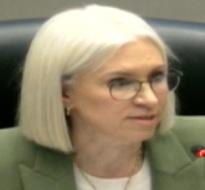
Commissioner Dana Barrett voices her opposition to Senate Bill 244, which allows criminal defendants to recoup fees if the prosecutor is disqualified for misconduct.
Barrett said the state should be responsible for paying legal fees for its constitutional officers, not the county.
the state Senate unanimously 55-0, citing support from Democrat minority leader Harold Jones II.
Citing an example of a teenager arrested for drug possession, Jones said if a prosecutor did something wrong, then the defendant is entitled to have their attorney fees back.
“Whoever it may be … I’m sorry it’s going to be Trump defendants, and you may have a problem with that, but they should get their money back,” Thorne said. “I think it’s hypocritical to say we’re protecting the taxpayer’s dollars when our district attorney entered into this case, costing us millions of dollars.”
Thorne also cited District Attorney Fani Willis’ racketeering case involving rapper Young Thug, or Jeffery Williams, and his label YSL Records, which turned into the state’s longest trial.
“It has cost the taxpayers millions and millions of dollars,” she said. “Not to mention the time, while our jails are overcrowded, and the court system has been clogged.”
Thorne also cited two recent fines, totaling less than $60,000, to cover the District Attorney Office’s Open Records Act violations.
“I fully agree that the state should probably pay for these fees because [Willis] makes it clear she is a state constitutional officer, she is not a county constitutional officer,” Thorne said. “I think we have to look at what’s just for the people in this case, and it might hurt doing the right thing.”
Commissioner Marvin Arington Jr., a practicing attorney for nearly three decades, said the bill gets it wrong, conflating disqualification and prosecutorial misconduct.
“A prosecutor can disqualify themselves, the issue is prosecutorial misconduct,” Arrington said. “The intent of SB 244, or the idea that it could apply to
the Trump case, is unbelievable … no, better yet, unconstitutional.”
Arrington said even if the bill is passed, it would be unconstitutional to apply the law retroactively.
“There’s numerous ways in which a prosecutor can be disqualified, but that doesn’t mean they committed prosecutorial misconduct,” he said. “I’ll make the motion that we speak loudly against SB 244 and oppose it in its entirety.”
Arrington said the reason that the bill passed unanimously is that someone lied about a substitution removing applications to the Trump case. If the state House amends the bill and it goes back to the Senate, Arrington said no Democrat will vote for it.
However, the case against Trump and the other defendants remains active. If the bill passes, and the case is dismissed, then Fulton County taxpayers could be on the hook for millions of dollars in legal fees.
In that case, the law would not be applied retroactively.
County Attorney Soo Jo said there is a claim under state tort law for malicious prosecution, if any law enforcement entity is deliberately targeting a person for improper purposes through the justice system. Basically, a remedy for Trump and his defendants exists in state law.
“Typically, retroactive application is not something that you can do with legislation,” Jo said. “In its current iteration, I do not read the bill to apply retroactively … I don’t know if that was the intent.”
Barrett said the bill should have been written specifically to address overall prosecutorial oversight and reemphasized the state’s responsibility in her final pitch.
Ultimately Fulton County commissioners seemed to agree that the state, not the county, should pay when a prosecutor is disqualified for misconduct and a criminal defendant is allowed to recoup their legal fees.
However, only Barrett and Arington voted to approve the resolution, and it failed.

Continued from Page 1
“We decided to build out model ordinances that were broadly protective for everyone in the community,” he said. “They are content neutral, and we decided to offer those as a resource for local governments looking to improve public safety.”
The first ordinance would restrict the overnight delivery of printed material to residences in the city.
Pelfrey says the ADL’s intention was to curb antisemitic fliers and other hateful mail that that has been distributed around Metro Atlanta, including Sandy Springs.
City Attorney Dan Lee expanded that goal.
“The [ordinance] is needed to affect the everrecurring situation of hate mail, or just unwanted mail being distributed in a wholesale manner,” Lee wrote in a memo to the City Council.
“… we’ve had instances with different entities’ … distribution of literature not asked for by homeowners, left in driveways, causing trash to accumulate and blow down the street,” he said.
The law would prohibit that delivery between the hours of 9 p.m. and 7 a.m., with a fine between $25 and $100 per instance.
Lee said the second ordinance deals with individuals or crowds blocking the public access to private property, including educational institutions, public facilities and places of worship. “Presently, private property owners can decide who can be on their property and the police can arrest, for trespassing, anyone that doesn’t comply,” he wrote. “The current problem that this proposal would affect is prohibiting individuals or crowds from blocking the entrance to private property.”
In addition to prohibiting someone from blocking access to private property, the ordinance also forbids them from blocking access to public facilities and parking lots.
The third ordinance would create an 8-foot buffer, in which speakers or protestors would have to gain consent before addressing someone.
The restriction would apply to anyone within 50 feet of a school, place of worship or public path.
Lee writes that the law is intended to address, “situations where different persons, with potential conflicts, may have a right or opportunity to be on the same property, and the ownership of that property cannot determine whether one or the other can be uninvited.”
“This ordinance … establishes some boundaries for people who have the right to free speech, but at the same time don’t accost the folks who have a right to not be accosted by speech and delivery of items that they don’t want.”
According to Lee, the proposed laws do not regulate the content of speech. He said the ordinances regulate where the exercise of First Amendment rights can occur, how law enforcement can address disorderly conduct and gives direction to the public on how to adhere.
City Councilwoman Jody Reichel asked if the proposed ordinances have been challenged in court in other jurisdictions.
Lee said Brookhaven is the only city in the state that has passed one of the ordinances, making the distribution of harassing material illegal between 9 p.m. and 7 a.m.
“So has it been challenged in court anywhere?” Reichel repeated, one of the Jewish members of the City Council. “I have lived in Sandy Springs for 30
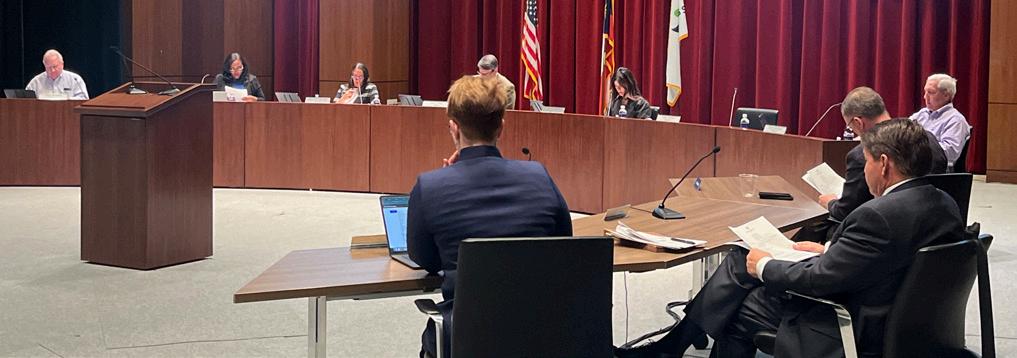
The Sandy Springs City Council meets for a work session March 18 to discuss three proposed ordinances related to the distribution of flyers, management of assemblies and public protest. After the discussion, Mayor Rusty Paul said the ordinances will come back for public hearings at an upcoming city meeting.
years, and I’ve never received one piece of hate mail.”
Lee said the courts have upheld similar laws, citing the 2000 Supreme Court case Hill v. Colorado. The Court ruled that a Colorado law, requiring speakers to obtain consent before getting within 8 feet of someone near a health care facility, did not violate the right to free speech.
Reichel said she asked Police Chief Kenneth DeSimone what events brought the city to the point of passing the ordinances. She also said she wants to avoid legal challenges and another city lawsuit.
Mayor Paul cited antisemitic flyering incidents in Sandy Springs and crowds blocking synagogue driveways in Cobb County as reasons for the proposed ordinances.
“These are an effort to try and get ahead of any of that type of behavior that occurs here,” Paul said. “The goal here is to balance everybody’s rights …”
City Councilwoman Melody Kelley said she remains opposed to the second and third ordinance, citing outstanding issues from the January work session.
“What I would prefer to see come back to us for a public hearing is the overnight door-to-door soliciting and canvassing ordinance,” she said.
City Councilman John Paulson said he thinks the ordinances preventing people from blocking others from entering buildings, contain acceptable limits and will hopefully “chill” the behavior in the city.
City Councilman Andy Bauman said he has received unwanted literature on his vehicle, some of it hateful, while parked in commercial areas. He and other council members asked Lee why the city limited the restriction to private residences.
Bauman also asked hypothetically what would prevent Sandy Springs from extending the ordinance to all hours of the day.
In a clarifying question he said, “So, there’s safe harbor for the distribution of this hateful literature, or other literature, during daylight hours?”
“That’s right,” Lee answered.
Lee explained his response by saying that the city’s ability to enforce the ordinances is important.
He alleged that the majority of incidents happen at peoples’ homes and while they are asleep.
“Between the hours of 9 p.m. and 7 a.m. … is generally when the trouble canvassing and trouble solicitation would occur,” Lee said. “During the daylight hours, property owners can police themselves and the misuse of this kind of activity.”
During the exchange Bauman brought up the law’s impact on other, non-hateful materials.
He asks Lee: “So, somebody wants to bring a perfectly appropriate newspaper to your house, they can’t do it at 6:45 under the ordinance in the morning, they can do it at 7:15?”
“That’s right,” Lee answered.
Bauman then addressed your reporter, sitting in the work session audience, and asked what time the Sandy Springs Crier is delivered.
Appen Media drivers deliver the free newspaper primarily to private single-family homes in Sandy Springs. Because drivers often work other jobs during the day, to limit traffic and ensure timely delivery of news, papers are often distributed overnight.
Richard T. Griffiths, president emeritus of the Georgia First Amendment Foundation, said an American’s First Amendment rights do not expire at sunset.
“Delivering a free newspaper is not disruptive, and it is not up to the city of Sandy Springs to determine when people can express themselves,” he said. “What this is going to generate is a bunch of expensive lawsuits that the city of Sandy Springs is going to lose … bankrolling a bunch of lawyers to defend a lawsuit that they will lose.”
Griffiths said there have always been time and manner restrictions on First Amendment expression, but the proposed ordinances are overreaching and will make it difficult for residents to know what is legal and not.
“We can talk about the tension between safety and expression, but in this case, they are taking this to a far extreme,” Griffiths said. “This ordinance appears to be a solution in search of a nonexistent problem in Sandy Springs.”
In 1992 the City of Sylvania tried to curb the delivery of free newspapers through an ordinance.
The case made it all the way to the Georgia Supreme Court, which ruled that the law violated the freedom of speech and press under the United States and Georgia constitutions.
In throwing the law out, the court wrote that while it did not ban all newspapers within the city it “severely limits their distribution to homes.”
Defending the publisher in that case was David Hudson of Hull Barrett, an Augusta-based law firm. Hudson and Hull Barrett are part of the team currently representing Appen Media in its case against Sandy Springs over the city’s handling of police records.
Communications Director Carter Long told Appen Media that the city has not yet determined when the ordinances will come back for a public hearing.
By SARAH COYNE sarah@appenmedia.com
FULTON COUNTY — Fulton County School Board Superintendent Mike Looney will recommend “necessary” budgets cuts for the 2026 fiscal year.
Looney offered an update on the current outlook for the 2026 budget at the March 19 school board meeting. As of now, the board plans to implement a 2.5 percent salary increase for employees, down from the originally planned 3 percent.
Last year, the county gave approval to a 4.5 percent compensation raise for eligible employees.
“In addition to that, is going to be necessary to adjust some of the supplements that we’ve been paying for employees,” Looney said.
At least $500,000 will also be cut from technology and software materials, alongside the reduction of central office positions.
“I have directed all department leaders to cut their non personnel expenses by 5 percent in the upcoming year,” Looney said.
Looney’s recommendations also include shuttering the elementary school section of Fulton Academy of Virtual Excellence due to low

enrollment numbers.
Looney’s reasoning for the proposals come from inflationary concerns, an increase in mandated expenditures, the increase of cost for employee benefits and retirement and compliance costs for doing business.
“It’s going to be necessary to make some reductions,” Looney said. “Key revenue constraints include a projected reduction in state revenue in the upcoming year and uncertainty in federal funding formulas, that along with continued downward pressure in revenue from local taxation.”
The school board is currently in their midway point for the development of fiscal year 2026 finances. A final vote for the budget will be held June 10. Before then, two public hearings will take place on May 6 and May 13.
“It’s going to be a tough budget year here in Fulton County schools, but we’re ready for it,” Looney said.
School enrollment is on pace to continue decreasing in the next five years, due to rising home prices and higher interest rates. The board projects that South Fulton enrollment will grow at a constant rate as the area’s “strong” housing market continues, while Sandy Springs will continue to decline. As for the rest of
The Georgia Legislature has taken a bold stand for our farmers and rural communities by passing SB 144— legislation that protects their access to vital crop protection tools, ensuring they can continue to feed America without unnecessary burdens.
We applaud Senator Sam Watson and Representative Steven Meeks, the dedicated sponsors of this legislation, and Agriculture Committee Chairmen Sen. Russ Goodman and Rep. Robert Dickey for their leadership.
A special thank you to Speaker Jon Burns and Lt. Governor Burt Jones for championing Georgia agriculture and securing the future of one of our state’s most important industries.
Thank you for standing up for Georgia farmers and families!
Modern Ag Alliance Supporting Those Who Feed America
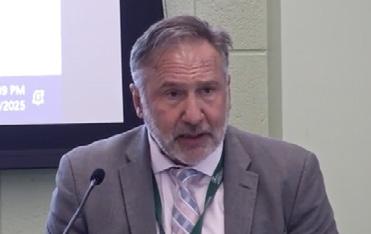
Fulton County School Board
Superintendent Mike Looney announces new budget cuts that have the chance to get approval for next year’s fiscal budget.
the county located in North Fulton, the board foresees a growth in certain cohorts, but not strong enough to counter overall enrollment decline.
The Fulton County School Boards projects that there will be a 1,023 loss in students next year and a 3,334 loss over the next five years. The projections include all elementary, middle and high schools, along with charter and alternative schools.
As of early March, Gwinnett Schools has the highest enrollment in the Metro area with approximately 182,000 students, while Fulton County stands around 87,000 students. A
correlation can be found when looking at affordable home options in Fulton County versus Gwinnett County.
Gwinnett’s median home sale price as of 2023 is priced at $330,000, in which 50 percent of homes classify as “below-median priced suburban neighborhoods,” according to the Metro Atlanta Housing Strategy. In comparison, the median home sale price for Alpharetta is $667,000, with 52 percent of homes in the “Higher-Priced Suburban Employment Corridors & Town Centers” classification.
The rest of North Fulton includes Johns Creek with the median price of $640,000, Milton at $870,000 and Roswell at $583,000.
In other business, the board will recommend the new name for the Conley Hills Elementary School replacement to be made into Briarwood Elementary School. The new name provides a history lesson, honoring the past high school that existed there.
“I think it is an opportunity for us to honor the past, as we continue to move forward with new energy,” Board member Kimberly Dove said.
The final vote will take place at next month’s board meeting.

By HAYDEN SUMLIN hayden@appenmedia.com
SANDY SPRINGS, Ga. — The Nimble Needle, a full-service shop tucked behind Sandy Springs City Hall off Johnson Ferry Road, is bucking the belief that needlepoint is a dying art.
Owner Jan Rodgers said the COVID-19 pandemic saw a resurgence in needlepoint with Americans stuck at home with a desire to shut out the noise in an uncertain and accelerating world.
Some people enjoy the repetitive and relaxing nature of needlepoint, using the artform to relax after getting home from work or as an activity away from cellphones with friends.
There’s an online world of social media influencers and writers promoting and celebrating needlepoint as a practice in mindfulness and a hobby away from screens.
Popular reality TV shows like “Bridgerton” and an endorsement from megastar Taylor Swift have cemented needlepoint’s comeback with young women around the world.
“This is actually our third location; we started over by the Punchline [off Hilderbrand Drive] and then we were in this center up by the dry cleaners, the location was about half this size,” Rodgers said. “We moved here just over three years ago.”
The Nimble Needle just celebrated its 16th anniversary March 11 as a locally owned and operated business.
Rodgers said she bought the shop from the original owner Stacy Brown in 2018.
“I had worked for Stacey the years that she was open,” Rodgers said. “Not full-time, I was actually a sales rep most of the time, but I worked for her some of the time and taught a lot of classes.”
Things were going so well in 2022 that the shop needed to expand and find more space for its weekly help sessions, classes hosted by special guest artists, hundreds of canvasses and thread.
“I bought it about a year and a half before COVID, and actually it wasn’t bad for our business because people were stuck at home looking for things to do,” Rodgers said. “People started painting, doing puzzles and stitching.”
The Nimble Needle employs 16 women.
“Plus, a data entry person and a social media person,” Rodgers said. “And my husband actually left his job two years ago … he does the website and a lot of the data entry too.”
Tim Rodgers, Jan’s husband, worked in the IT industry before stepping away and helped create the shop’s first website.
Emmie Rodgers, one of Jan’s daughters, is the Nimble Needle’s social media

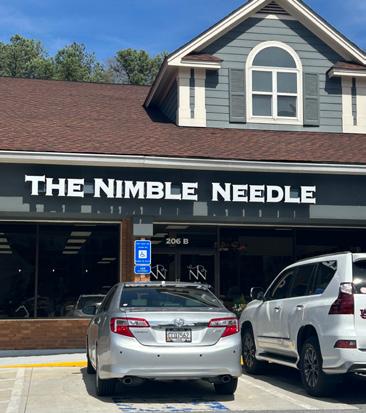
print some canvasses, but it’s a kind of kludgy process as far as trying to get lines straight, so ink ends up on every intersection of canvass.”
manager.
She said there’s been a wave of young women interested in needlepoint during and after the pandemic.
Emmie Rodgers said sometimes men show up to classes, often brought along by their girlfriends, but needlepoint is really something that anyone can pick up if they want to.
Jan Rodgers said the Nimble Needle’s social media presence has made a real difference bringing more people into the shop.
Some customers have been stitching for decades and others just picked up a canvas after watching a recent wave of TikTok videos promoting the hobby as an alternative to cell phone and social media addiction.
The blending of different generations at the Nimble Needle, including teenagers and grandmothers, makes its community rare.
Rodgers said the back of the shop at 206B Johnson Ferry Road was originally supposed to be the classroom, but it wasn’t big enough for most of them. Instead, the Nimble Needle hosts workshops and classes around three large
wooden tables in the front of the shop.
“We teach beginner classes … how to paint canvasses … finish your stitch piece into an ornament,” Rodgers said. “Then, we have national teachers who come in for what they call embellishment classes where they take a canvass and tell you what kind of stitches to use on it.”
There’s usually one or two classes open to the public on weekends.
Because needlepoint is an artform, businesses avoid large corporate competition with an emphasis on the community of artists, experienced stitchers and beginners.
Needlepoint is an intricate art form, requiring a dedication to detail, patience and a willingness to learn. The number of different stitches, ranging in complexity, can be intimidating for novices, but local shops like the Nimble Needle exist to provide all ability levels with some guidance.
“Canvasses are stitch painted, so there’s a dot of paint on every intersection of the canvass,” Rodgers said. “All the canvasses that you see on the wall are hand-painted; They are starting to
Despite all the advancements in human technology, needlepoint artists still prefer methods used by the ancient Egyptians more than 3,000 years ago. Rodgers said the technology isn’t quite there yet to make printed canvasses as viable as traditional, painted ones. She said once you’ve made a stitch, it’s difficult to know what’s underneath, which makes each drop of paint crucial to the look of the final product, whether it be a pillow, wall hanging or belt.
Twice a week on Monday mornings and Wednesday evenings, the shop hosts a help session.
“Marcie Slotin teaches the help classes,” Rodgers said. “It’s just bring whatever you’re working on, and she will help you learn new stitches and try new threads.”
People from around the Metro Atlanta, the state of Georgia and the Southeast patronize the Nimble Needle in Sandy Springs.
Rodgers said there’s an existing needlepoint shop in midtown Atlanta and Savannah just got a new one, but there are not a lot of options close by. She said the 15 miles between the two Metro Atlanta shops sometimes takes an hour to navigate.
All of the new people interested in needlepoint puts a smile on Rodgers’ face.
“We give out some beginner information, and we have to constantly remake that,” she said. “We’re seeing a lot of new stitchers and younger ones, which is good for the future.”
By HAYDEN SUMLIN hayden@appenmedia.com
SANDY SPRINGS, Ga. — The city of Sandy Springs Community Development and Public Works departments work in tandem to deliver CDBGfunded sidewalk projects.
The Nixon administration created the Community Development Block Grant program in 1974 to meet three objectives, benefit residents of distressed neighborhoods who are primarily lowand moderate-income, eliminate slums or blight and meet urgent community needs.
Each year, Sandy Springs uses its annual allocation of federal funds from the U.S. Department of Housing and Urban Development to advance the Roswell Road (Ga. 9) Multiyear Sidewalk Project.
The projects aim to improve pedestrian accessibility, which is the more important for lowto moderate-income residents who are more likely to walk or use public transportation.
The CDBG Consolidated Plan, first developed in 2008, is a dynamic five-year blueprint currently focused on the competition of Roswell Road Multiyear Sidewalk Project before moving onto work along Hope Road in the city’s North End.
There are three projects currently in the concept and design phase along Northwood and Long Island drives south of I-285 and Hope Road between Dunwoody Place and Roswell Road.
Along Northwood Drive at Roswell Road, the city
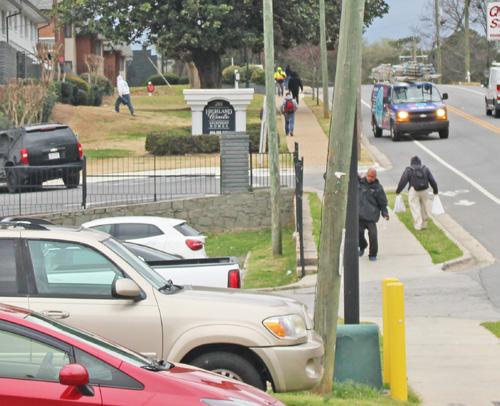
HAYDEN SUMLIN/APPEN MEDIA
Residents walk up and down Northwood Drive south of I-285 in Sandy Springs March 20. The city has plans to use federal funding through the Community Development Block Grant Program to fill in sidewalk gaps and add mid-block crossings.
is proposing 675 feet of a 6-foot-wide sidewalk with two signalized mid-block crossings and pedestrian lighting. The cost estimate is around $400,000.
Because the surrounding neighborhood is a primarily Hispanic community, the city works with the Community Assistance Center to provide


by
NORTH FULTON MASTER GARDENERS in partnership with Georgia Native Plant Society & the Alpharetta Community AG Program
Educational speakers, Fleatique, Children’s activities, Plant vendors, Food vendors, and Master Gardeners to answer your gardening questions. For more information: www.nfmg.net/garden-faire
The popular North Fulton Master Gardeners Passalong Plant Sale will feature more than 2000 beautiful plants suitable for sun or shade.

The North Metro Atlanta Chapter of the Georgia Native Plant Society will have a selection of approximately 2000 native perennials, shrubs, vines, and trees.

The Alpharetta Community Agriculture Program will have around 5000 unique and carefully selected varieties of organic, heirloom, and non-GMO plants, grown from seed at Old Rucker Farm.



project updates and materials in Spanish, Assistant Communications Director Dan Coffer said.
At Long Island Drive and Roswell Road, a $50,000 project calls for a sidewalk connection to existing ones along the state route.
A project manager in the Sandy Springs Public Works Department said the city’s Community Development Department works to identify qualifying census tracts, needed projects and secure loans to accompany federal grants. Once the project is ready, he said the Public Works Department takes over delivery.
Sandy Springs owes $1.88 million over the next six years to repay its loan advance, valued at $2.9 million. The city says Section 108 Loan funds allow it to accelerate project construction without significant financial impact.
Sandy Springs received $418,619 in 2024 through its CDBG allocation. Staff is anticipating receiving notice from HUD regarding the 2025 allocation by April.
After a March 18 public hearing on the 2025 action plan, it is set to come back for City Council adoption May 6.
The plan through this fall is to advance the design phase of all three projects to right-of-way acquisition, if needed. The segments off Roswell Road are anticipated for construction in 2026.
Along Hope Road, there are plans for two sidewalk segments on both ends of the street at Roswell Road and Dunwoody Place to be completed in 2027.



METRO ATLANTA — The Atlanta Regional Commission Board will recondition the Atlanta Regional Freight Mobility Plan after adopting the major update on March 12.
The plan will provide resources for local jurisdictions, policy makers and business leaders. with a comprehensive resource to better accommodate the freight traffic that drives the economy in Metro Atlanta.
“The Regional Freight Mobility Plan provides a roadmap to help metro Atlanta accommodate ever-increasing freight traffic volumes while enhancing safety, boosting the economy, and preserving our quality of life,” ARC Executive Director & CEO Anna Roach said. “The plan is a critical tool that will guide investments and inform decision-making over the next several decades.”
Metro Atlanta is one of the nation’s largest hubs, with connections to the Port of Savannah, the nation’s fourthbusiest container port. Volumes of freight and e-commerce are expected to rise even more in the next 25 years due to population growth in the region and ports.
The plan will include updates such as freight design guidelines, county-

level factsheets, an interactive freight dashboard, a model truck parking zoning ordinance and a list of 147 recommended transportation project to improve freight mobility and safety in the region.
Freight traffic has a chance of doubling by 2050, to combat this the plan has developed two freight growth scenarios. The “low-growth scenario”
with 69 percent and a “high-growth scenario” with 118 percent will provide plans for the coming years.
In 2019, Georgia saw a total freight volume of 31 million tons with a total value of $398.5 billion. The state is currently ranked fifth in the nation and first in the Southeast, with one in three jobs associated with the sector. Efforts for the freight planning
will continue in the coming years, including a creation of additional Freight Cluster Plans in areas with significant industrial development. The plans will focus on facilitating the movement of goods, reducing traffic congestion and improving safety, mobility and access for all roadway users.
— Sarah Coyne

If you live in Georgia, you can still get help with recovery from Helene or Debby through housing assistance, loans, resources and more. Stay in touch and check your application for updates.
Housing: FEMA may call for more information from an unfamiliar number. Be sure to answer, as FEMA may be able to help with immediate housing, additional support and information on housing opportunities.
Home Inspection: Inspectors will make an appointment before they visit and will show your application number and their photo ID.
SBA Centers: FEMA staff is available to assist at Small Business Administration centers in Bulloch, Coffee, Jeff Davis, Lowndes, Richmond, Telfair and Toombs counties.
Statesboro Library: 124 S. Main St., Statesboro, GA 30458
Satilla Library: 200 S. Madison Ave., Douglas, GA 31533
Jeff Davis Rec Dept: 83 Buford Rd., Hazlehurst, GA 31539
VSU Foundation:
901 N. Patterson St., Valdosta, GA 31601
Centro Cristiano Oasis VIP: 3265 Deans Bridge Rd., Augusta, GA 30906
Telfair CSC:
91 Telfair Ave., #D, McRae-Helena, GA 31055
Center for Rural Entrepreneurship: 208 E. 1st St., Vidalia, GA 30474
Read your FEMA letter carefully. If you’ve applied for FEMA disaster assistance and were not approved, you may need to send additional documentation.
Scan the QR code or go to fema.gov/HelpIsHere and select “check your status” to upload documents, track your application, update contact information, get directions or get help.

ONLINE: fema.gov/HelpIsHere
DOWNLOAD: The FEMA App CALL: 1-800-621-FEMA (3362)

RAY APPEN Publisher Emeritus ray@appenmedia.com
We’re off to see the wizard, the wonderful… Nope.
That may be how it feels, but, well, nope. Ain’t no heart for the lion, nor brains for the scarecrow, just smoke and mirrors and a distant, vague memory of a better time, and then, perhaps, the giant con.
Tariffs and trade, tariffs and trade, oh my. Make us great again, make us great again, oh my. And who doesn’t long for that – those times? Anybody? Bueller?
Off to find the wizard.
As kids, we used to look forward to seeing “The Wizard of Oz.” Back then, it only came on occasionally, maybe once or twice a year. The same was true for “Snoopy’s Christmas” or “It’s the Great Pumpkin, Charlie Brown” around Halloween. “Gone with the Wind” was often aired once a year.
Now they are available 24/7, everywhere – no longer something to look forward to – something lost. It was a great time to remember; it was a good time to know – and a giant raw-nerve sucking sound, mostly inaudible – for those who don’t know it, never knew it. And that is
somewhere close to where the reality of our dilemma is found today.
Back then, we all enjoyed the fruits of the greatest generation – single household incomes, a car in every driveway, and driveways as far as the eye could see, thousands of affordable homes in all those subdivisions, courtesy of Levitt & Sons (Levittown) and the like.
And jobs everywhere. They weren’t sexy or transitory like the high-paying tech and health jobs we see today; think working for Ma Bell (AT&T), P&G, the Deere Company, General Motors or even the local bank. They paid a living wage that afforded those homes, a family with three or four kids, and their education – along with two weeks’ vacation at Disney, Silver Springs or “out west” with the camper trailer in tow.
Yes, those jobs are around today, but the affordable homes, that affordable family, the careers, the affordable trip to Disneyworld and Yosemite aren’t to most. Ditto for that stability, security and predictability of the past. And we really, really don’t like living in an unsecure, unpredictable world. No one does. It is hyper-toxic. Hence, “find the wizard.”
Life really was arguably “great” before. You went to college and got a degree. You went out and found a job that became a career; you stayed with that company for about 30 years, and
then you (mandatorily) retired at 65. You were able to buy that affordable home you purchased shortly after starting your career, the one you raised your young family in that you grew out of, and which led to that larger one with a pool perhaps – the one you then sold to downsize and retire to the condo in Sarasota.
Do you remember?
Of course, you don’t remember if you were born say after about 1970 or so, a little bit after the last of the boomers were born. And if you can remember those times, you … well … you are old, like I am. My generation has the benefit of those experiences being part and parcel to our frame of reference, our world view, our perspective.
So what?
So, we are obviously in a period of change – perhaps a massive one –socially, politically and geo-politically. Expectations and past experience (the driver of expectations) surges across the country in a seemingly random pattern or no pattern at all. Those expectations – and perhaps that missing frame of reference – are in large part responsible for what is going on today, right now. Meanwhile, one of the 800-pound gorillas in the room – technology – is evolving at a blinding pace while our social evolution – our ability to understand, manage, and deal with technology – is
evolving at a snail’s pace.
Roughly half the country, about 170 million people born after 1970, have not known and have no concept of that “car in every driveway, three kids and retire to Florida” experience. The lack of “stability” and “predictability” is probably that other 800-pound gorilla in the room today.
All those born after 1970 know is that, generally, they are not very happy about “now,” and they are not really sure why or what is causing that unhappiness.* They want something better. And all that most of them see is a train leaving the station, and they are not on it.
So, they are off to find the “wizard” for solutions. I don’t blame them. I would too. But I hope when they find that solution – when they find that wizard – it’s not just some con man hiding behind a curtain in Oz, but it may well be. Time will tell. Be careful what you ask for; you might just get it. Bueller? Bueller?
*Bob Dylan - as usual - nailed our current dilemma in his song “Ballad of a Thin Man,” written in 1965. If you are interested, Google “lyrics Ballad of a Thin Man Dylan.”
PS: The current Bob Dylan movie (“A Complete Unknown” is fabulous! Well scripted, well-acted, and very entertaining!

PAT FOX Managing Editor pat@appenmedia.com
I addressed my local school board in Dawson County last Tuesday. Turns out, I was the second person in two years to speak during the public comment portion of a school board meeting or work session. That doesn’t include public hearings about the budget, setting the tax rate or the new statewide homestead exemption. Those hearings were all advertised well in advance.
But, regular meetings? Why, I wondered, do so few residents talk at our school board meetings?
As it happens, our school district has a policy requiring anyone wishing to address the board during the public comment portion of a meeting to file a 24-hour notice. The notice must
include your name and the topic you wish to discuss.
Problem is that the school district does not post the meeting agenda until around noon the day of the meeting. The agenda lists items the board will discuss that evening.
“As I understand it,” I told the School Board, “district policy requires patrons to submit a request to speak on a topic 16 hours before they can possibly know what they want to talk about.”
I recounted a couple of recent measures the board approved – one involving $5 million in expenditures – that the public did not know about until the day of the meeting. Even then, according to the policy, they wouldn’t have been allowed to comment.
To their credit, the board and superintendent tacitly agreed the setup was absurd. The superintendent immediately recognized the problem when I spoke to her before the meeting.
She told me it would be fixed.
One School Board member thanked me for bringing the issue to light. She said it’s simply the way things had always been done.
So often, government officials have no idea what it’s like to be on the outside, how difficult it is for the average Joe to be heard.
Late last year, astronomers at the ATLAS survey telescope in Chile detected a small asteroid moving away from Earth. Further observations calculated that the object is on a path that may bring it on a collision course with our planet on Dec. 22, 2032.
Latest studies estimate the asteroid, dubbed 2024 YR4, is between 130 and 295 feet wide, and its chances of striking Earth are close to 2 percent. Tracking the object will continue through May. After that, it won’t be visible again for another three years.
This is a real deal.
Don’t confuse it with a similar sighting announcement Jan. 2 from the Minor Planet Center at the HarvardSmithsonian Center for Astrophysics at Cambridge, Mass. That object was tracked as having come within 150,000 miles of Earth. That’s closer than the moon.
But, within a day, the Planet Center deleted the warning when the object turned out to be a car – Elon Musk’s Tesla Roadster launched in 2018. Yes, it’s still up there, with a dummy astronaut behind the wheel and roughly 4 million miles on its odometer. The tires are still good, though.
Suppose for a moment that as it approaches in 2032, the YR4 asteroid strikes the Tesla Roadster, diverting it just enough to miss Earth. Musk will again have saved the planet. And, yes, I checked. The Roadster is equipped with airbags.
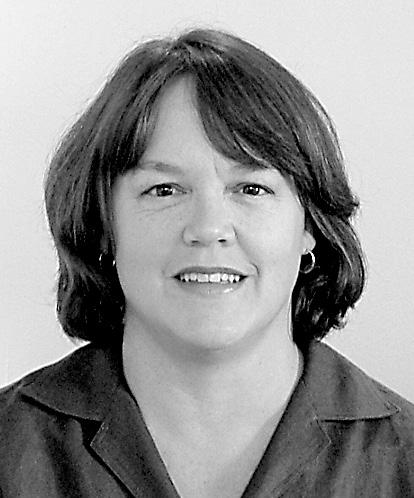
Joe Greear calls his memoir “Growing Up on the Edges” because his home was on “the edge of Brookhaven, the edge of Peachtree Creek and the edge of Tullie Smith’s property.”
When the family moved away, the home which had been surrounded by woods and farms was surrounded by high-rise buildings. (“Growing Up on the Edges,” dekalbhistory.org)
Greear’s parents met on the island of Guam in 1948. His father was a draftsman from Georgia and his mom an architect from Washington state. They were both working civilian jobs constructing a new military base.
The couple married in Guam. When they returned to the U.S., they lived in a cottage on Joe’s grandfather’s farm in Helen, Georgia. Then, they moved to Atlanta where their first home was at Oglethorpe Apartments, located on land where Blackburn Park is today.
Joe and his brother, Sol Jr., were born while the family lived at Oglethorpe Apartments. Their parents searched for a house close to their work in downtown Atlanta, with room for a vegetable garden and not too close to neighbors.
They found a two-bedroom, one-bath home on two acres in DeKalb County off North Druid Hills Road. The location was between Buford Highway and I-85, on the south side of North Druid Hills, except I-85 was yet to be built. Greear recalls North Druid Hills Road as a rural two-lane that ran from Peachtree Street to Lawrenceville Highway.
There was a single lane dirt road which led to their house. A gravel turn-around was in front of their home, no lawn or front yard. They shared the driveway with two other houses. The lowest part of the driveway along the bank of Peachtree Creek sometimes flooded.
Greear’s father planted a garden with corn, tomatoes, collard greens and more. The vegetables were canned or frozen by his mom. She made homemade tomato sauce, vegetable soups and pickles.
Their neighbors were Margaret Young and the Browns, whose house “…looked like a cottage out of a fairy tale.” The Browns used a coal-burning pot-bellied stove. Joe Greear recalls going to their home to watch Lloyd Bridges in the scuba diving television show “Sea Hunt.” Greear’s parents did not own a TV because they thought it was a bad influence.
The neighbors also shared a party line telephone.
“Each household’s phone had a distinctive ring, such as two short and one long, that told you if the call was for your house.” If they wanted to make an outgoing call and someone else was on the line, they had to hang up and wait until that person finished their call.
Joe and Sol loved exploring the woods around their home and beyond. Their parents hung up an empty camp stove canister which they would strike with a metal rod to call the boys back to the house.
Cora Lee Bates from Helen, Georgia, took care of the boys while their parents worked. She took Joe and Sol on walks up North Druid Hills across Buford Highway, turning left on Roxboro Road to visit a duck pond at the Standard Club’s golf course. Cora

The Greear home that once sat off North Druid Hills Road in
Lee’s small home was along the way, behind the large home of a woman named Guest. Later, this land was sold and developed into a Red Roof Inn and a private school.
When Joe got older, he walked to Brookhaven, crossing the railroad tracks near where North Druid Hills Road met Peachtree Road. “Just past the railroad tracks was the Brookhaven Building Supply. I recall it as one long loading dock with an order counter and a warehouse behind.
“When shopping at Brookhaven Building Supply, my dad would order his lumber and supplies at the front counter and the employees would load the order into our 1940s Willy Overland.”
Greear recalls an A&P grocery at the corner of Dresden Drive and Peachtree, where his family shopped. His mom would call A&P with her order from work and pick it up on her way home.
There were other shops and the Brookhaven Theater on the other side of Peachtree Street. Greear saw his first scary movie at The Brookhaven Theater. More on that movie, the construction of I-85 and the family’s neighbor Tullie Smith in the next Past Tense.
Award-winning author Valerie Biggerstaff is a longtime columnist for Appen Media and the Dunwoody Crier. She lives in Atlanta. You can email Valerie at pasttensega@gmail.com or visit her website at pasttensega.com.


Name: American Pride Bank
Key Team Members: Erik Bykat, chief lending officer; Doug Fountain, commercial relationship manager; Richie Perez, business development officer; and Jennifer Overton, customer service manager.
Description: American Pride Bank is a community bank that specializes in high-touch, friendly, and flexible banking and lending for small business owners and individuals. We partner with people and places to build wealth, grow wealth and ensure customers can pass it on for future generations.
Month Opened: October 2024 - Ribbon cutting March 27, 2025”
Address: 6503 North Point Parkway, Alpharetta, Ga
Phone: 678-233-2700
Web Address: https://www. americanpride.bank
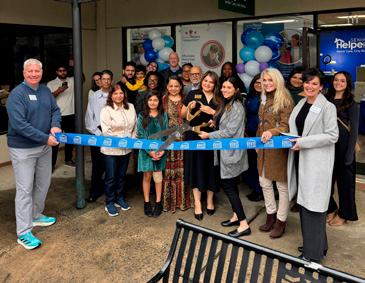
Name: Senior Helpers North Metro Atlanta
Owners: Amber Hamani and Anum Virani
Description: Senior Helpers of North Metro Atlanta is the premier provider of in-home senior care. We offer tailored home care services ranging from companion care for seniors who need daily assistance to in-depth specialized care for those with Alzheimer’s, dementia, Parkinson’s and other chronic diseases.
Opened: May 2024
Address: 3000 Old Alabama Road, Suite 111, Johns Creek
Phone: 770-442-2154
Web Address: seniorhelpers.com/ga/ north-atl

Join today for
DC Aiken
Big Sky Franchise Team
David & Michelle Bertany
Amour & Duane Carthy
Adam Corder
Barbara Anderson
Kerry Arias
Scott Baynton
Joseph Bell
James Bennett
Patrick Cressaty
Robert Flint
Robin Fricton
Zachary Hahn
Allison January
Rita Brown
Mark Casas
David Conti
Theodore Davis III
Maureen Drumm
Carl Abernathy
Bruce Ackley
Salpi Adrouny
Alpharetta Lions Club
Omar Altalib
Dave Altman
Ron Altman
Joel Alvis
American Legion Post 201
Alice & Dr. Richard Appen
Gaye Armstrong
Mary Asbury
Bangkok Boxing LLC
Shannon Banna
Beth Barnes
Janet Bass
Caitlin Bates
Jannet Bauer
Barbara Bauschka
Miriam Beattie
Kathy Beck
Laura Bentley
William Bentley
Leslie Berry
Tom Billings
Tochie Blan
Ron Boddicker
Jodi Bogen
Sherri Bolles-Rogers
Helen Borland
Debra Bowen
Joe Bowen
Ryan Brainard
Mark Brandus
Mel Brannen
Carol Bright
Linda Brill
Dorothy Brouhard
Erendira Brumley
Bernhard Burgener
Alvin Burrell
Mike & Theresa Buscher
Mary Busman
Clea Calloway
Kirk Canaday
James Carr
Bridgette Carter
William Cartwright
Frank Catroppa
Pat Check
Virginia Christman
Christopher Cleary
Ann Coaloa
Kim Coggins
Evelyn Collazo
Michael Mackenzie
Communications
Joan Compton
Carol Cookerly
Terri Coons
Rhonda Cude
Connie Cunningham
Christopher Cupit
David Davis
Duane DeBruler
Marilyn DeCusati
Rebecca Donlan
Tom Driscoll
Michael Dudgeon
Jeanette Dummer
DutchCrafters Amish Furniture
Thomas Edmonds
Denise Eicher
Mim Eisenberg
Danny Elkins
Su Ellis
Martha Fasse
Nell & Doug Fernandez
Daniel Fleck
Lee Fleck
Laura Floyd
Cathy Flynn
Paul Folger
Adrienne Fontaine
Mary Ford
Nanci Foster
Amy Frederick
Kelly Frommer
Carol Fry
Tracey Ganesh
Daniel Gay
John Gibbs
John Gilberto
Leslie Gilliam
Michael Kenig
Roderick Liptrot
Bob Meyers
Claude Nardy
Cliff Oxford
Charlcie Forehand
Aileen Horton
Deborah Jackson
Ali Mahbod
Richard Matherly
Bailey & Ryan Gladysz
Michelle Glotzbach
Harvey Goldberg
Christopher Goodrich
Phyllis Goodrich
Ralph Griffin
Marilee Hamilton
Susan Hanna
Marion Hannah
Roxanne Hazen
Joe Hirsch
Penn Hodge Dianne & Steffan Holmquist
Joan Hostetter
Austin Hughes
Jacqueline Hursh
Lynn Johnson
Tyler Jones
Arthur Kebanli
Laura Keck
Mark Kelly
Nancy Kennell
Randall Kent
Carol Kerr
Allison Kloster
Dyna Kohler
Larry Krueger
Jess & Chris Kysar
Malinda Lackey
Brandon Leach
Dennis Lee
Ken Leffingwell
Carol Lehan
Bonnie Lind
Francia Lindon
Harlan Little
Ross Long
Kyser Lough
Rita Loventhal
Brenda Lundy
Rita Loventhal
Karen Magill
Kyile Marshall
Julie Martin
Carla Masecar
Valerie Matthews
William Maxwell
Ross & Lori Ramsey
Sarah Reiter
Mark Rundle
Lynn Thomas Kim Truett
Evan McElroy
Vickie McElroy
Patricia Miller
Anne Peer
Robert Popp
Rachel McCord
Austin McCully
Diane McDonald
Karen McEnerny
Lynn McIntyre
Mike McLoughlin
Jennifer Mendoza
Al Merrill
Chris Miller
Christine Miller
Joe Modica
Fred Moeller
Sarah Moen
Catherine Moore
Carol Morgan
Kathy Morgan
Stu Moring
Leslie Mullis
Donna Murphy
Jack Murphy
Cindy Nolan
North Fulton Master Gardners, Inc.
Tricia Novarro
Bob O’Brien
Anne Pappas
Lynn Pennington
Jonathan Peters
Kurt & Leslie Phillips
Mary & Jan Phillips
Debra Powell
Joyce Provissiero
Chuck Pugh
Robert Radloff
Raj Rajagopalan
Ashwin Ramaswami
Cheryl Rand
Jean Rearick
Joseph Reed
Righteous PR
Angie Rigney
Neil Robertson
Kimberly Robinson
Matt Rohs
Kim Romaner
Kelly Sarmiento
Stephanie Schniederjan
The Schoenblum Family
To join go to appenmedia.com/join and follow the prompts to select your membership level and select your t-shirt size! Questions? Email Hans Appen at hans@appenmedia.com or call 770-442-3278.
Roger Wise Jr. Colt Whittall
Sergey Savin
Helen Scherrer
Kate Seng
Kimberly Verska Carol Williams
Robert Scholz
Stephanie Schuette
Susan Searles
Tina Shelton
Lisa Shippel
Joanne Simmons
Tom Simon
Cindy Simpson
Robert Singleton
Faye Sklar
Judith Slaughter
Andy Smith
Gena Spears
Donald Spencer
Melissa Spencer
Gloria Stathos
Robert Stevens
Wesley Stewart
Cathryn Stovall
Celeste Strohl
Diana Sullivan
Andy Sumlin
Mike Tasos
Candice Teichert
The Small Business Advisor
William Tietjen
Lisa Tilt
Michael Townes
Trunnion LLC
Matthew Tyser
Ollie Wagner
Lewis Walker
Jonathan Washburn
Michael Watson
Michael Weiss
Herbert Wells
Sally White
Thom White
Umpika White
Christine Williams
Jamie Wimberly
Jonathan Winkie
Nancy & Dave Wistrand
Carla York
Jonathan Young

Scan QR code to join the Appen Press Club




The connecting letter is outlined, giving you the correct number of letters for each answer (the answers in line 1 are 5, 5 and 4 letters). The clues are numbered 1 through 7, with each number containing 3 clues for the 3 answers on the line. But here’s the catch! The clues are not in order - so the first clue in Line 1 may (or may not) actually be for the second or third answer in that line. Got it? Good luck!


1. Wealthy. Medical assistant. Door sign.
2. Some kind of a nut. Crude group, briefly. Hospital area.
3. Hospital VIP. Magician’s stick. Road __.
4. Place to acquire some suds. Exploding star. Blood __ (exam)
5. Picture of health. Desert beast. Glove material.
6. Medical man with a knife. Indian bread. Psyches.
7. Dog house. Gyro meat. Hospital accommodations.
1 Wealthy. Medical assistant. Door sign.
2. Some kind of a nut. Crude group, briefly. Hospital area
How to Solve: Each line in the puzzle above has three clues and three answers. The last letter in the first answer on each line is the first letter of the second answer, and so on. The connecting letter is outlined, giving you the correct number of letters for each answer (the answers in line 1 are 4, 5 and 5 letters). The clues are numbered 1 through 7, which each number containing 3 clues for the 3 answers on the line. But here’s the catch! The clues are not in order - so the first clue in Line 1 may (or may not) actually be for the second or third answer in that line. Got it? Good luck!
3. Hospital VIP. Magician’s stick. Road ___
4. Place to acquire some suds. Exploding star. Blood ___ (Medical exam)
5. Picture of health. Desert beast. Glove material
6. Medical man with a knife. Indian bread. Psyches
7. Dog































Full-Time Vice President of Community Engagement

Will finance big or small guaranteed. A+ rating at BBB. Kitchen, bath, tile, pavers, more. Free visit/ estimate. Big discount! 205-907-1749
Matthew the Handyman - Carpentry, painting, drywall, plumbing. Electrical and small jobs. 404-547-2079.



NFCC is seeking a qualified candidate to fill the fulltime Vice President of Community Engagement position. The Vice President of Community Engagement (VPCE) is a senior leadership role responsible for developing and implementing strategies to build meaningful relationships with the community, donors, and stakeholders.
The VPCE will lead initiatives to increase awareness, partnerships, and financial support for the organization’s mission. This position oversees community engagement, marketing, public relations, and volunteer programs to ensure alignment with organizational goals.
If this sounds like the role for you, we’d love to hear from you! Please submit your resume to jobs@nfcchelp.org

Part-Time Thrift Shop Associate – Bilingual Preferred
NFCC is seeking a qualified candidate to fill the part-time Thrift Shop Associate position. One of the primary responsibilities of this role is to provide a high level of customer service in the Thrift Shop. The associate is responsible for all cash register and client clothing program transactions and keeping the merchandise in the store neat, clean, and organized. The role requires a friendly and customer-focused demeanor where all shoppers are treated with dignity and compassion.
If this sounds like the role for you, we’d love to hear from you! Please submit your resume to jobs@nfcchelp.org



